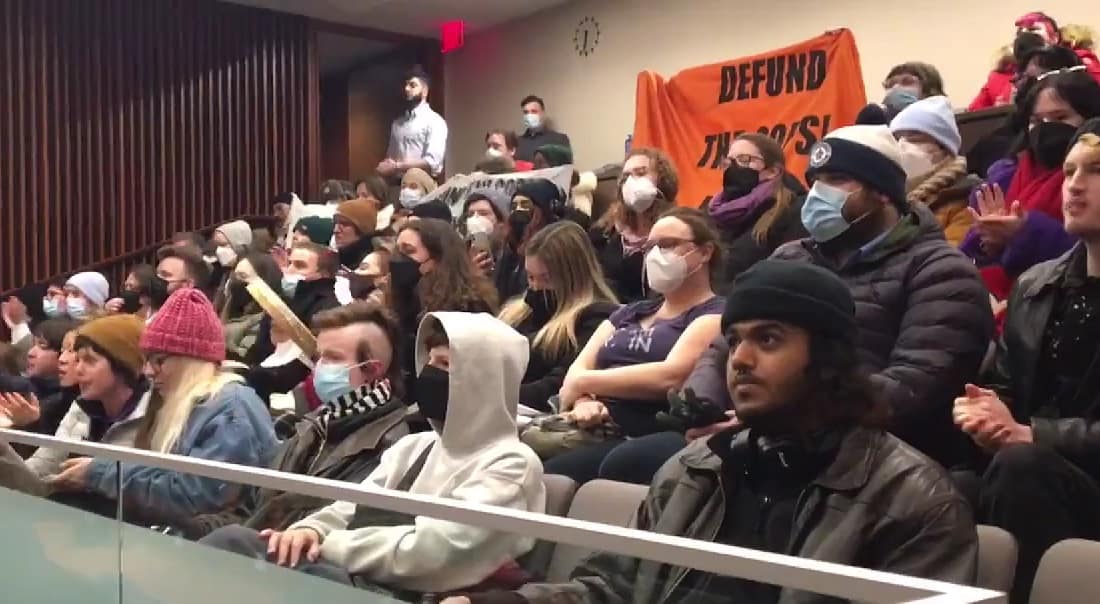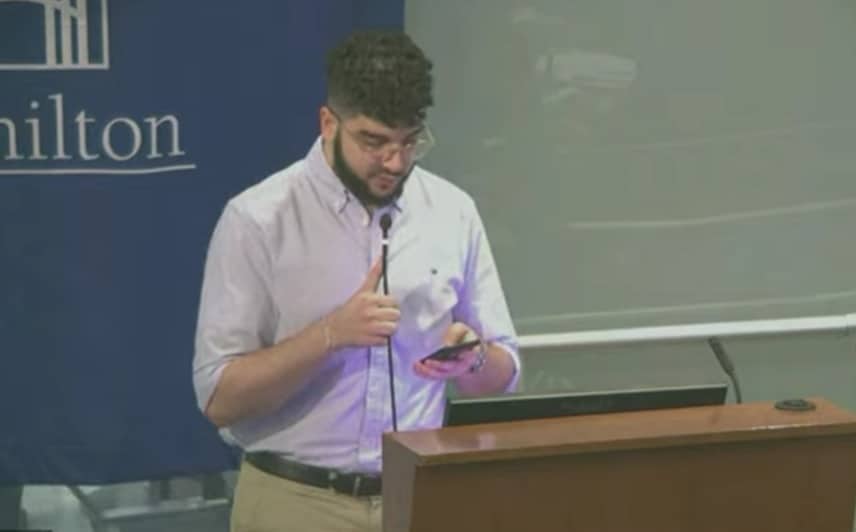‘Defund or resign;’ Hamilton protest over police budget increase halts meeting
Published February 6, 2023 at 8:56 pm

Protesters demanding that the city’s elected leadership nix a proposed Hamilton Police Service (HPS) budget increase halted a public meeting — at which many local residents had advocated for just that.
Shortly before 6:30 p.m. on Monday, a group which had just protested outside of Hamilton City Hall entered the gallery in the council chamber, reportedly filling all of its seating capacity. At issue for the protesters was a 6.71-per-cent increase — around $12 million — to the HPS budget. They entered as the general issues committee (GIC) was at around the three-and-a-half-hour mark of hearing delegations on the 2023 City of Hamilton tax-supporting operating budget, where any public member could request five minutes to delegate to city council about what they feel should be priorities for the city. Around 34 of the 47 accepted delegations had been heard.
“This group is not leaving until council votes against the police budget,” Ward 2 public school trustee Sabreina Dahab announced, according to The Public Record. They also chanted “defund or resign” and “no justice, no peace.”
Ward 9 Coun. Brad Clark, chair of the GIC, adjourned the meeting. A live feed, which inTheHammer relies on to cover council, was cut, and staff left the room. Around 10 of the 16 members of council had been present when the protesters arrived. With the live feed cut, it was unclear how many stayed in their seats.
By visual audit, Coun. Maureen Wilson (1), Cameron Kroetsch (2), Nrinder Nann (3), Tammy Hwang (4), Matt Francis (5), Tom Jackson (6), Jeff Beattie (10), Craig Cassar (12), and Alex Wilson (13) had all been present within 10 minutes of the protesters filing in. Coun. John-Paul Danko (8) and Mark Tadeson (11) were also present.
The group asked, from the gallery, whether councillors planned to vote for the budget. The Public Record reported that Kroetsch, the lone councillor present who is on the Hamilton Police Services Board, nodded in response to the question. Nann later stated on social media that she would not support the HPS budget.
“I nodded in response that I am very concerned about the HPS budget ask and cannot support it,” she wrote.
“A budget is a statement of priorities. How and what we invest in matters,” Nann added.
To be clear, in Chambers, I nodded in response that I am very concerned about the HPS budget ask and cannot support it.
— Nrinder Nann (@NrinderWard3) February 7, 2023
The protesters left after about 80 minutes. Responding officers from Hamilton Police did not enter the building.
Now "Boo boo" and more boos from the gallery directed at Ward 9 Clr Brad Clark in the Chair. #yhmcc
— Joey Coleman (@JoeyColeman) February 7, 2023
Protestor leader @sabreina_dahab says today was successful. Now leading the protesters out of City Hall. @HamiltonPolice did not enter the building.
— Joey Coleman (@JoeyColeman) February 7, 2023
It became public knowledge in December that the HPS requested a budget increase for 2023 to $195.85 million. Police Chief Frank Bergen said most of the increase is related to paying officers and civilian employees. Employee-related costs consume roughly 92.5 cents of every dollar in the HPS budget.
In the fall of 2020, demonstrators camped in front of city hall and called on the city’s leadership to re-invest half of the HPS budget into free and affordable housing. The budget for that year was equivalent to about $190.54 million in 2022 currency, based on the Bank of Canada inflation calculator.
Many of the nearly three dozen delegations at the meeting on Monday spoke against the police budget increase. They also pointed to the lack of affordable housing in the city and the inadequacy of social services. At a recent emergency and community services meeting, Coun. Clark also spoke of frustration with the city’s inability to find stable dwellings for an unhoused population of at least 1,500.
‘Refusal to take bold steps,’ says former Wesley worker
The last speaker before the adjournment on Monday, Mohamed Shalalfeh, referenced the 2020 sit-in. Shalalfeh, a former housing liaison worker with the Wesley Urban Ministries not-for-profit social services agency, contrasted one of the high-end condo projects in the city with the housing shortage.
“Right now, downtown, you have the urban core where many unhoused people gather,” said Shalalfeh (secondary photo). “And right in the same area, is a construction site for a luxury condo building, to be furnished by luxury brand Louis Vuitton. With all due respect, and frankly speaking, this is something that is emblematic of this city’s approach to housing — and it is something that we should all be embarrassed by.
“The housing crisis is not exclusive to Hamilton,” he added. “But the fact is the lack of affordable housing in the city is a natural conclusion of decades of policy choices and what is now called ‘maintenance budgets’ that unfortunately reflects an apathy and a refusal to take bold steps to build affordable housing to secure the present and future… I hope this helps this city make the decision to address the root issue, which is to build affordable housing instead of the status quo of using hotels due to shelter overflow and to disperse encampments violently with a police force with a perpetually overinflated budget.
“Two years ago, we had two whole weeks of protest, people camping out at city hall, demanding we build affordable housing. This city watched as they were ignored, and the former mayor, Mayor (Fred) Eisenberger, directed police to remove them.
“Two years later, can any of us honestly say that the protesters were wrong?” Shalalfeh said. “How many people could have been housed? How many lives could have been saved?”

On a few occasions during the meeting, Clark had to advise delegates not to individually name HPS officers who had been charged with a crime. Councillors were also instructed to “ask questions of the delegators, not get into a debate.” After one speaker, Clark reminded Ward 7 Coun. Esther Pauls — who is on the police services board with Kroetsch and Mayor Andrea Horwath — not to make a statement objecting to those mentions.
The second-last speaker, Ward 2 resident Becky Shaini Katz, cited statistics on police violence.
“For the police to ask for an increase when they returned a surplus (in 2022) is essentially laughing in the face of other deprived sectors,” Katz said.
“Chief Bergen says for every one-per-cent decrease, they (HPS) would have to cut 19 full-time officers,” Katz added. “I suggest starting with the 50-plus officers who, since 2017, have been charged with a crime. From 2021 to ’22, there were also 28 injuries to people while in HPS custody reported to the SIU (Ontario Special Investigations Unit, the provincial police watchdog).
“I’m tired of seeing community members, including Black and Indigenous people, diminished because council are afraid to tell police ‘no,’ ” Katz added. “Invest this in community services.”
Jessica Merolli, another Ward 2 resident who is a political science professor at Sheridan College, also reminded councillors of the recent court ruling that essentially makes it illegal to remove encampments. On Jan. 27, a judge barred the Waterloo region from removing encampments without offering supportive housing to people living rough. Merolli averred that the court ruling should spur cities such as Hamilton to focus on housing.
“That court ruling demonstrates the path we have gone down as a city is not only inhumane but also unconstitutional,” Merolli said. “We need an approach to housing that is a basic human right. This would mean we prioritize affordable housing and proper supports, instead of criminalizing what we all know we would do in similar circumstances. It cannot be done simply by the city. But we can demonstrate to the senior levels of government our commitment to address these problems by prioritizing units in our budget — instead of funding police services who have simply helped the city displace people with no stable housing.”
Merolli added that even if employee-related costs consume much of the HPS budget, the city can choose a different path.
“To frame police services as simply an issue of rising costs and inflation is disingenuous and an attempt to depoliticize a political decision,” she said. “I join the call to stop funding that is not working for our community.”
‘Higher slope to climb”
Kim Martin, executive director of the Social Planning and Research Council Hamilton (SPRC), presented some local demographic trends. Martin noted Hamilton has a 25 per cent visible minority population, compared to 9 per cent in 1996. Older adults aged 55 to 64, and 65 and over, also make up a growing percentage of the city. Martin suggested the city will need to reform the city enrichment fund that supports community programming.
The city calls the fund a “municipal investment.” In 2022, the recommended funding was $6.088M — 32 times smaller than the proposed ’23 HPS budget. The funding requests totalled $9.858 million, about one-20th the size of the proposed ’23 HPS budget.
“It’s very important for us to look at organizations that are primarily serving (overlooked) these groups that are in need and looking at funding models that can help them,” Martin said. “I know that with the city enrichment fund, there is a maximum fund for which a group can apply, which is 30 per cent of their existing budget. That is a healthy amount for a large organization to ask for from the city. For a smaller organization, 30 per cent of a $50,000 budget is not very much. And those organizations are more likely to be led by racialized leaders and serve racialized communities.
“So it’s almost like a higher slope to climb, and that’s something we need to consider in being inclusive in our budget.”
One of the delegators, Donald Currie, said he is unhoused and also spoke against adding another $12 million to the HPS budget. He listed off several city-funded shelters and community services, such as the Wesley Day Centre, that have closed or are unavailable. He also challenged councillors to live on Ontario Disability Support Program or Ontario Works for as long as two weeks.
“You don’t know what it is like until you have lived it,” Currie said. “To rent a place for $600 with cockroaches and bedbugs and have $100 left for food, I challenge anyone to do that.”
insauga's Editorial Standards and Policies advertising





